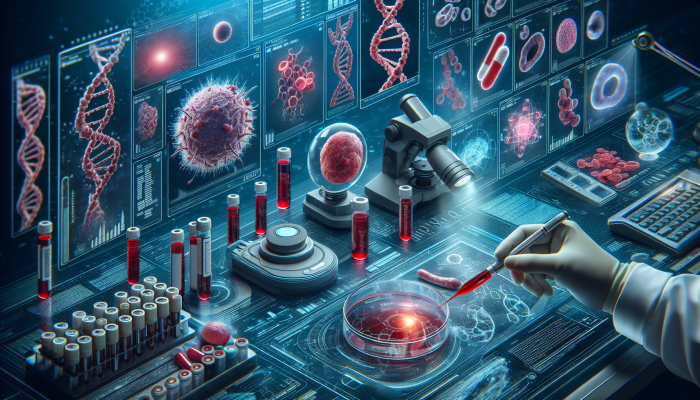Revolutionize Cancer Detection with Advanced Blood Testing: Uncovering New Technologies
The landscape of cancer detection is undergoing a remarkable shift, primarily influenced by significant advancements in blood tests for assessing cancer risk. These innovative tests are groundbreaking in their ability to identify potential cancer markers present in the human body, which enables earlier interventions and drastically improves patient outcomes. To effectively navigate the intricate and often daunting realm of cancer diagnostics, it is vital to cultivate a comprehensive understanding of the foundational principles that drive these tests and to stay informed about the latest groundbreaking innovations emerging in this crucial sector of healthcare.
Exploring the Detailed Mechanisms Behind Blood Tests for Cancer Risk: In-Depth Analysis

At the heart of blood tests for cancer risk lies the pivotal identification of specific biological indicators referred to as biomarkers. These biomarkers act as essential signals that indicate the presence of potential cancer or a heightened risk of its development in the future. They consist of a diverse range of substances, including proteins, genes, and various other components produced either by cancerous cells or by the body’s immune response to the presence of cancer. The scientific foundation of these cutting-edge tests relies on sophisticated methodologies that proficiently identify these markers, utilizing a wide array of state-of-the-art technologies.
One of the fundamental techniques employed in these evaluations is known as the liquid biopsy. This revolutionary approach entails the analysis of a blood sample to detect elements such as circulating tumor DNA (ctDNA) and circulating tumor cells (CTCs). The non-invasive nature of this method allows for comprehensive assessment of a patient’s cancer risk without necessitating more invasive procedures like traditional biopsies. Moreover, advancements in technology, particularly in next-generation sequencing (NGS), have significantly bolstered the sensitivity and specificity of these tests, enabling them to detect even the most minute traces of ctDNA.
The precision of blood tests for cancer risk is closely connected to our understanding of cancer biology. Distinct types of cancer release unique biomarkers into the bloodstream, which drives ongoing research aimed at discovering new markers that could serve as early warning signs. For instance, monitoring levels of prostate-specific antigen (PSA) is common for evaluating prostate cancer risk, while the CA-125 marker is frequently linked to the detection of ovarian cancer.
In addition, the incorporation of artificial intelligence (AI) into the analysis of test results is dramatically transforming this field. AI algorithms have the capability to scrutinize vast datasets, uncovering patterns that may escape human detection, thereby significantly enhancing the predictive power of these tests.
Discovering the Latest Innovations in Blood Tests for Cancer Risk: Key Advancements
The domain of blood tests for cancer risk is currently experiencing extraordinary advancements that have the potential to redefine cancer screening and preventive care strategies. A particularly significant breakthrough is the introduction of multi-cancer early detection (MCED) tests. These revolutionary tests are designed to identify multiple types of cancer from a single blood sample, effectively reducing the need for invasive procedures and enhancing overall patient comfort and experience.
Recent research has demonstrated that MCED tests can successfully detect cancers in their earliest stages, often before any clinical symptoms appear. This early detection is vital because it is directly correlated with improved treatment outcomes and increased survival rates. For example, a study published in a leading oncology journal showcased the remarkable capability of an MCED test to identify malignancies that are typically challenging to diagnose at an early stage, such as pancreatic cancer and ovarian cancer.
Another noteworthy development in this field involves the examination of methylation patterns present in circulating DNA as a diagnostic tool. Variations in methylation often signify cancerous processes, leading researchers to explore how these patterns can be leveraged for more accurate cancer risk assessment. This innovative approach could offer a highly sensitive method for detecting malignancies for which effective screening protocols are currently lacking, thus improving patient care.
Additionally, collaborations between technology companies and healthcare providers are fostering the development of innovative diagnostic solutions. These partnerships aim to utilize big data and machine learning to enhance the analysis of blood samples, resulting in more precise risk assessments and tailored management strategies for patients.
Understanding the Transformative Benefits of Liquid Biopsies in Cancer Detection and Treatment Approaches
Liquid biopsies represent a revolutionary leap forward in the realm of blood tests for cancer risk. Unlike traditional biopsies that require invasive tissue samples, liquid biopsies provide a minimally invasive alternative that can be performed multiple times, allowing for continuous monitoring of cancer progression and responses to treatment. This characteristic is particularly beneficial for patients who may not be suitable candidates for surgical biopsies due to various health conditions.
Liquid biopsies operate by isolating and analyzing ctDNA or CTCs extracted from a blood sample. The ability to monitor these cellular components provides critical insights into tumor dynamics and potential genetic mutations that may arise throughout the duration of the disease. For instance, identifying specific mutations can assist oncologists in determining targeted therapies, thus personalizing treatment plans for improved therapeutic effectiveness and success rates.
The integration of liquid biopsies into clinical practice is already demonstrating promising results. Recent clinical trials have indicated that these tests can detect recurrences in patients who have previously undergone cancer treatments, often several months ahead of traditional imaging techniques. This timely detection can lead to prompt interventions, ultimately enhancing survival outcomes and the overall health of patients.
Moreover, liquid biopsies enable real-time monitoring of treatment responses. By evaluating ctDNA levels during therapy, healthcare professionals can assess the effectiveness of the treatment regimen and make necessary adjustments to optimize patient care. This proactive approach to monitoring signifies a considerable shift toward more dynamic management of cancer care, ensuring that patients receive the most effective treatment tailored to their unique needs.
In summary, blood tests for cancer risk, particularly through the utilization of liquid biopsies, are revolutionizing the field of oncology. Their potential for early detection, ongoing disease monitoring, and personalized treatment strategies positions them as indispensable tools in the relentless battle against cancer. As research and technological advancements continue to progress, the prospects for these tests to enhance patient outcomes and redefine cancer care remain exceptionally promising and encouraging.
Join Our Facebook Community for the Latest News and Insights!

This Article Was Originally Published On https://bloodtest.co.uk
The Article: Blood Tests for Cancer Risk: Pioneering Early Detection Methods first appeared on: https://ezbloodtest.com
The Article Cancer Risk Blood Tests: Innovative Methods for Early Detection Was Found On https://limitsofstrategy.com
Comprehensive References for Further Reading:
Cancer Risk Blood Tests: Innovative Methods for Early Detection
Cancer Risk Blood Tests: Cutting-Edge Techniques for Detection




Your exploration of advanced blood testing technologies for cancer detection is both timely and crucial, especially given the growing emphasis on personalized medicine. The identification of biomarkers indeed represents a significant leap forward in our approach to early cancer detection.
I appreciate your thoughts on the article! It’s fascinating to see how the conversation around personalized medicine is evolving, particularly in cancer detection. The potential of biomarkers to tailor treatments based on individual profiles is opening new doors.
It really is intriguing how personalized medicine is reshaping our understanding of cancer detection. The evolution of biomarkers highlights just how far we’ve come in recognizing that each individual’s genetic makeup can significantly influence treatment outcomes. It makes you think about the implications for early detection as well—imagine a future where routine tests could identify cancer much earlier by understanding these unique profiles.